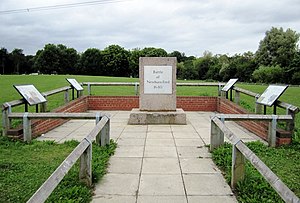Battle of Newburn
| Battle of Newburn | |||||||
|---|---|---|---|---|---|---|---|
| Part of Bishops' Wars | |||||||
 Monument marking the site of the Battle of Newburn |
|||||||
|
|||||||
| Belligerents | |||||||
|
|
|
||||||
| Commanders and leaders | |||||||
| Alexander Leslie | Lord Conway | ||||||
| Strength | |||||||
| 20,000 | 2000 infantry and 1500 cavalry | ||||||
| Casualties and losses | |||||||
| 200 approx. | 300 approx. | ||||||
The Battle of Newburn, sometimes known as Newburn Ford, was fought on 28 August 1640 during the Second Bishops' War between a Scottish Covenanter army led by General Alexander Leslie and English forces commanded by Edward, Lord Conway. Conway, heavily outnumbered, was defeated, and the Scots went on to occupy the town of Newcastle, obtaining a stranglehold on London's coal supply. Charles I had no choice but to agree on October 26 to the Treaty of Ripon, under which the Scottish army in northern England would be paid daily expenses, pending a final treaty of peace. To raise the necessary funds Charles had to call the Long Parliament, thus setting in motion a process that would lead to the outbreak of the English Civil War two years later.
In attempting to force the Scots to accept a new Prayer Book in 1637, Charles sparked a crisis that led to the compilation and subscription of the National Covenant in early 1638, a document which rejected all innovations in worship that had not been subject to the approval of both the Scottish Parliament and the General Assembly of the church. In November of the same year a General Assembly in Glasgow not only rejected the Prayer Book, but also expelled the bishops from the church, as suspect agents of the crown. Charles' refusal to accept this led to the outbreak of the First Bishops' War in 1639.
This war saw much posturing but little real action. In the end the two sides, reluctant to push the issue, concluded hostilities in the Pacification of Berwick, an agreement without an agreement, that was at best a breathing space. The Scots agreed that the Glasgow Assembly had been 'illegal'; Charles agreed that a new Assembly, together with a Parliament, should meet in Edinburgh in the summer of 1640. As none of the issues that had led to the signing of the National Covenant had been settled, it was obvious to all that the Edinburgh Assembly would simply confirm the decisions taken at Glasgow. This was to lead directly to the outbreak of the Second Bishops' War in which Newburn was the only battle. To raise the necessary funds Charles summoned a new Parliament to Westminster, the first to meet for eleven years, hoping to use English patriotism as a counter to the rebel Scots. But the Short Parliament was more interested in raising various grievances long suppressed and was quickly dismissed, leaving the king worse off than before.
...
Wikipedia
